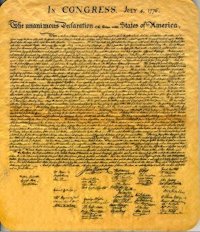
|
Some Common Myths Thought to be True - Myth 13
Myth 13: Declaration of Independence signed of July 4th, 1776
It's a humor12-myth that the declaration was signed on July 4, 1776.
The Journals of Continental Congress, which published the names of the signers,
led everyone to believe that the declaration was signed. In reality, the signed
version of the declaration came up at a later date.
Thomas McKean, one of the signers brought to notice that some of the signers
were not even elected to Congress on July 4. It brought forth the fact that if
the declaration were signed on the 4th of July, Charles Thomson and John
Hancock would have been the only two signatories.
Hancock and Thomson are believed to have signed the handwritten version, but
the historian Julian P. Boyd thought this unlikely.
|
| Declaration of Independence | |
|
The engrossed copy of the declaration proudly bears the signature of John
Hancock, the Congress President then. His signature appears above the other
signers. Thomas McKean is believed to be the last person to sign.
Thomas Jefferson and John Adams were among the other signers of the
declaration. Edward Rutledge was the youngest signatory of the Declaration of
Independence while the oldest signer was Benjamin Franklin. Thomas McKean,
Elbridge Gerry, Oliver Wolcott and Lewis Morris were the ones signing late.
|
|
| ⇦ Back to Myth 12 Return to Myth Choices Page 1 On to Myth 14 ⇨ | |